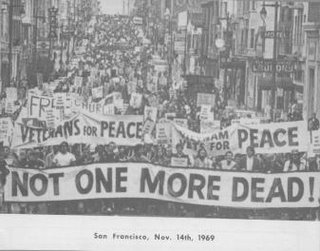 During a teleconference on Thursday with U.S. personnel stationed in Afghanistan, George Bush reportedly said:
During a teleconference on Thursday with U.S. personnel stationed in Afghanistan, George Bush reportedly said:"I must say, I'm a little envious. If I were slightly younger and not employed here, I think it would be a fantastic experience to be on the front lines of helping this young democracy succeed."Forty years later, the man clearly regrets his decision to remain home when he could've easily arranged a tour or two in Vietnam after he finished college. Apparently he hasn't been able to persuade his two daughters into signing up for gigs in Iraq or Afghanistan, but it's not too late for him to vicariously witness the excitement and romance of combat."It must be exciting for you ... in some ways romantic, in some ways, you know, confronting danger. You're really making history, and thanks."
Consider, for example:
The nature and sheer extent of American casualties [in Iraq] — officially in the tens of thousands, but hundreds of thousands have sought medical help — has caught the U.S. government off guard.There are an estimated 10,000 veterans who have suffered traumatic brain injuries in Iraq and Afghanistan from roadside bombs and other causes, and many of them will require intensive lifelong medical and personal care. Another 800 veterans of Iraq and Afghanistan lost limbs due to amputations since 2001.
From wounded soldiers who faced dilapidated conditions at Walter Reed Army Medical Center to troops whose mental problems have been overlooked, Iraq veterans have paid the price.
"The government was not ready for the casualties to come home," says Brad Trower, 29, a Marine Corps veteran from High Ridge who was injured twice in his tour in Iraq.
When Trower returned to St. Louis in 2005, suffering from traumatic brain injury after two vehicles he was riding in were blown up within a month of his arrival, he got "zero response" initially from local Veterans Affairs officials, though he is now doing well.
Rep. Bob Filner, D-Calif., chairman of the House Armed Services Committee, says the nation has failed to heed the lessons of Vietnam, a war whose veterans constitute half of the 400,000 people sleeping on America's streets tonight.
Though the number of veterans today is smaller, the percentage of veterans who become homeless, commit suicide or face other social problems, partly because of a lack of treatment, is similar to that of the Vietnam era, Filner says.
"We know how to deal with it," he says, "but we apparently don't want to deal with it."
[...]
Of the 1.7 million service members with recent combat experience, some 800,000 are now veterans entitled to VA health care and benefits. Of those, 300,000 have had treatment; 40 percent were diagnosed with a mental health problem, more than half with PTSD, according to Veterans Affairs figures released as a result of a lawsuit by Veterans for Common Sense, a nonpartisan veterans advocacy group. Paul Sullivan, the group's executive director, says the patient figure could eventually reach 700,000.
[...]
Thirty-one percent of the veterans have filed disability claims, waiting on the average more than six months for them to be processed. Delays are pronounced for those who returned to small towns or rural areas in the Midwest or South far from VA facilities, as happens with many reserve troops.
This tragic situation [1] offers many volunteer opportunities for Bush, even if he's not eager to relocate to Iraq or Afghanistan. After all, he won't be "employed here" after next January 20th. So let me offer a few modest suggestions for how he might spend his spare time after clearing brush on the Crawford ranch:
- He can volunteer for the Walter Reed Army Medical Center's Auxiliary, which offers "the opportunity for fun and friendship, for networking and sharing, as well as a chance to support our hospital and its patients."
- If he has a little spare change after paying his dues at his golf club in Waco, he can contribute to Walter Reed Hospital's Army Emergency Relief Fund , which provides for veterans' "emergency financial needs such as food, rent, utilities, emergency transportation and vehicle repair, funeral expenses, medical/dental expenses, or personal needs when pay is delayed or stolen." And he doesn't even have to wait until he qualifies for unemployment.
- Dubya might also join Stephen Colbert in cutting some generous checks for the Fisher House veterans' program, which provides "'a home away from home' that enables family members to be close to a loved one at the most stressful time -- during hospitalization for an illness, disease or injury."
And keep those checks coming, too, George. A recent Harvard study predicts that "taxpayers' cost for the care of injured veterans will run up to $700 billion."
NOTES
[2] To help him prepare for his new career as a volunteer, Dubya might take a look at Elizabeth Reuben's article on the current situation in Afghanistan in the New York Times Magazine (February 24th).
With a tip o' the hat to Fred Kaplan at Slate and Digby at Hullabaloo. A commenter on Hullabaloo came up with this highly-relevant quote from F. Scott Fitzgerald's The Great Gatsby:
"They were careless people... they smashed up things and creatures and then retreated back into their money or their vast carelessness... and let other people clean up the mess they had made..."PHOTO: George Bush playing soldier at the DMZ in Korea (note the covers still on the binoculars).
UPDATE - 3/16/08:
When I mentioned these volunteer options for Dubya on Hullabaloo, a commenter pointed out: "My God, haven't they suffered enough?" The point is well taken, but somehow I don't think anyone needs to lose any sleep over his showing up at a clinic for TBI victims. Bush has already declared his retirement goals: clearing brush, riding his mountain bike and making incoherent speeches for big money.


